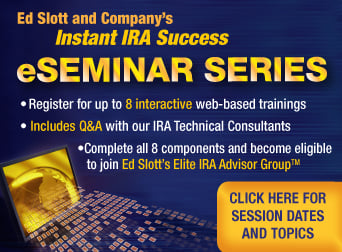
- Ed as a Speaker
- Ed Slott's IRA Advisor Newsletter
- Shopping Cart
- Discussion Forum
- IRA Resources
- IRA and Tax Tables
Assistance
MAKE ROTH IRA CONVERSIONS LESS TAXING
|
The June issue of Ed Slott's IRA Advisor Newsletter lays out a call to action. 2010 will always be known as the Year of The Roth IRA Conversion. Financial advisors will be measured by what planning they did during 2010 with low tax rates. The impact on your clients' retirement accounts and your professional legacy comes down to what you know and when you act (BEFORE YEAR-END). For a more detailed analysis of this subject, check out the June issue of the newsletter. |

|
Inside Ed Slott's IRA Advisor NewsletterMake Roth IRA Conversions Less Taxing Finding Conversion Cash Now... Before Tax Rates Increase
If you are not already an Ed Slott's IRA Advisor Newsletter subscriber, you can preview past issues before subscribing. |
|

Q: If a person converts to a Roth at the age of 57, does that person have to wait 5 years to withdraw the conversion amount and the earnings without paying a penalty? A: You can always take a distribution of basis from a Roth IRA. Basis is annual contributions and converted amounts. Those distributions will NOT be taxed when they are withdrawn as they were subject to tax when they went into the Roth IRA (or they were already after-tax amounts). There are ordering rules for Roth distributions. The ordering rules are as follows: contributions come out first; converted amounts come out next; funds that were taxable at the time of conversion come out before funds that were not taxable at the time of conversion; earnings come out last. A distribution of any converted amounts or earnings before age 59 1/2 will be subject to the early distribution penalty. In addition, the earnings distributed will also be taxable. |
||
|
|||







